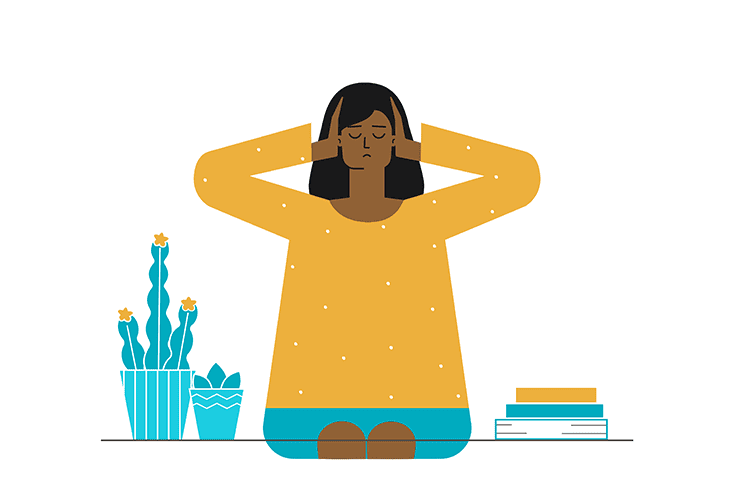April 14, 2023
By Eli Pinker

After two hospital stays for severe depression, I decided to take medical leave from college. I won’t be graduating with my friends this spring. It has been a difficult and painful gap year, but I’ve learned a few lessons that have kept me going.
For those who are struggling with depression and adjusted timelines, here are my recommendations.
Hold on to “Forever Moments”
When my depression was at its worst, I started to notice tiny moments that I would want to live in forever. For me, these brief instances of happiness were like sparks in a fire-pit or shooting stars that gave me a hint of where unknown universes lie.
These moments were:
- Sitting in the car with my parents and grandparents on the way to my brother’s new apartment.
- The entranced look in my kitten’s eyes when she saw a fly buzzing around the ceiling of the study.
- The rush of warmth in my body upon taking a big bite of food at my favorite childhood restaurant.
- The sound of the wind rushing by my ears as I approached the bottom of a difficult black diamond ski run and glided across a scenic traverse.
- The ceremonial way my dad put down the last piece of a 1000-piece puzzle we completed at 3 a.m.
I call these my forever moments. My depressed brain tells me that they’re too short to be worth living for. But they’re like fireworks. A spark on its own is fleeting, but pieced together, a number of sparks can create something as grand as fireworks over the Hudson River on the Fourth of July. Combined, they are a spectacle worth living for.
When I am mindful, the sparks are everywhere. When I am thoughtful, I can magnify them, increase their frequency, time them to make smiley faces, rockets and patterns in the sky. When temporary pain feels too great to bear, the combined force of all these forever moments keeps me alive.
Practice Distress Tolerance
Intense exercise is one of the TIPP (temperature, intense exercise, paced breathing, paired muscle relaxation) skills I learned from in my Dialectical Behavioral Therapy (DBT) group, and I think it’s one of the reasons I’m still alive.
I’ve started to enjoy running because it makes me feel like I can control my pulse when my heart threatens to beat out of my ribcage. When I feel out of control, I run around the park for 20 minutes. My response is to make my heart pound faster, to normalize the idea that faster doesn’t necessarily equal worse.
Remember That Your Experiences Are Valid
I’ve heard people say, “it’s all in your head.” Well, of course it is — why else would it be called mental illness? You would expect heart disease to be in the heart and lung disease to be in the lungs. But the underlying implication is that because this illness lies in the brain, it is somehow less “real.” I’ve listened to cheerful playlists first thing in the morning, gone to parties trying to act like my normal self, left funny post-it notes on the walls for myself — but “cheering up” isn’t that simple. Being hospitalized and taking a medical leave were in no way desirable outcomes.
When I pushed myself to be happy, I returned to my room absolutely drained, and the low was worse. When I spent time walking with my friends on a really bad day, I accidentally twisted my ankle several times. And my physical symptoms became torturous. I couldn’t hold down food for three days prior to my first hospitalization, and I lost eight pounds without trying in two weeks. The thought of my favorite foods made me nauseous. I kept dropping things and knocking cups of tea over on my desk, nearly damaging my laptop. My hands were shaky, and my stomach often hurt. I couldn’t sleep for more than two hours per night, so I tried taking melatonin, only to wake up in the middle of the night unable to breathe.
It felt like a vicious cycle; every lost hour of sleep worsening my appetite, and I just didn’t know how to get out of it. I got blood tests; my doctor checked my abdomen and even sent me to a lab to test for stomach ulcers.
This illness truly took over my body. I’m not in this situation due to a lack of willpower, and, if you are struggling, neither are you. It’s a long, difficult path — it’s not quick and simple. Your pain and your frustrations are real.
Know That You’re Stronger Than You Think
As a kid, I loved Winnie the Pooh. Most of the time, the animals in the Hundred Acre Woods were up to silly things, but I had a favorite quote from the series.
When Christopher Robin says farewell to Pooh, he leaves a message that I sometimes wish someone would say to me.
"You are braver than you believe, stronger than you seem, smarter than you think and loved more than you'll ever know."
It’s no small feat that you’re alive, despite it all. You are stronger and more courageous than you think.
Eli is a college junior on a medical leave after two hospital stays for severe depression. You can see more of her writing on her blog.
Submit To The NAMI Blog
We’re always accepting submissions to the NAMI Blog! We feature the latest research, stories of recovery, ways to end stigma and strategies for living well with mental illness. Most importantly: We feature your voices.
LEARN MORE